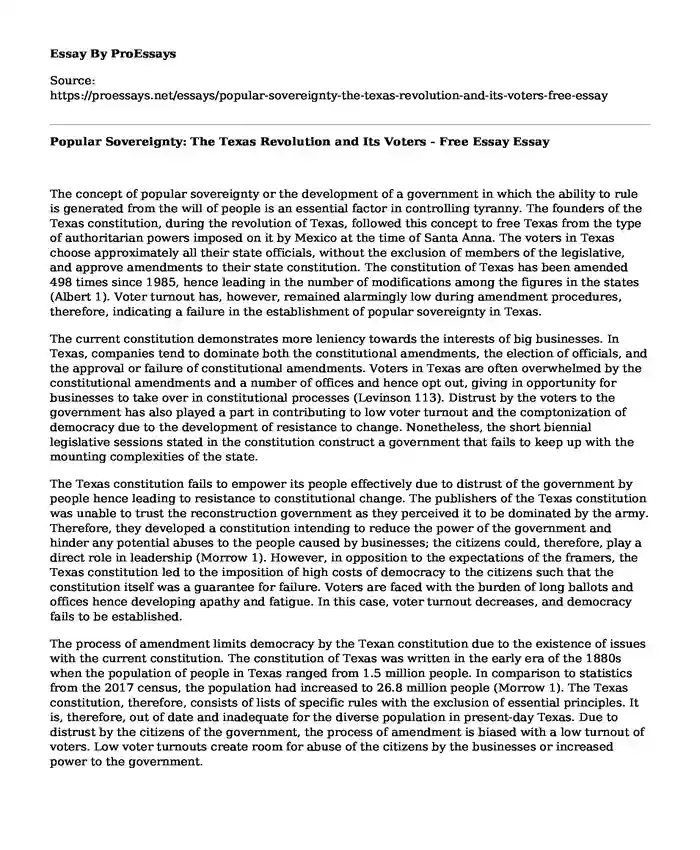The concept of popular sovereignty or the development of a government in which the ability to rule is generated from the will of people is an essential factor in controlling tyranny. The founders of the Texas constitution, during the revolution of Texas, followed this concept to free Texas from the type of authoritarian powers imposed on it by Mexico at the time of Santa Anna. The voters in Texas choose approximately all their state officials, without the exclusion of members of the legislative, and approve amendments to their state constitution. The constitution of Texas has been amended 498 times since 1985, hence leading in the number of modifications among the figures in the states (Albert 1). Voter turnout has, however, remained alarmingly low during amendment procedures, therefore, indicating a failure in the establishment of popular sovereignty in Texas.
The current constitution demonstrates more leniency towards the interests of big businesses. In Texas, companies tend to dominate both the constitutional amendments, the election of officials, and the approval or failure of constitutional amendments. Voters in Texas are often overwhelmed by the constitutional amendments and a number of offices and hence opt out, giving in opportunity for businesses to take over in constitutional processes (Levinson 113). Distrust by the voters to the government has also played a part in contributing to low voter turnout and the comptonization of democracy due to the development of resistance to change. Nonetheless, the short biennial legislative sessions stated in the constitution construct a government that fails to keep up with the mounting complexities of the state.
The Texas constitution fails to empower its people effectively due to distrust of the government by people hence leading to resistance to constitutional change. The publishers of the Texas constitution was unable to trust the reconstruction government as they perceived it to be dominated by the army. Therefore, they developed a constitution intending to reduce the power of the government and hinder any potential abuses to the people caused by businesses; the citizens could, therefore, play a direct role in leadership (Morrow 1). However, in opposition to the expectations of the framers, the Texas constitution led to the imposition of high costs of democracy to the citizens such that the constitution itself was a guarantee for failure. Voters are faced with the burden of long ballots and offices hence developing apathy and fatigue. In this case, voter turnout decreases, and democracy fails to be established.
The process of amendment limits democracy by the Texan constitution due to the existence of issues with the current constitution. The constitution of Texas was written in the early era of the 1880s when the population of people in Texas ranged from 1.5 million people. In comparison to statistics from the 2017 census, the population had increased to 26.8 million people (Morrow 1). The Texas constitution, therefore, consists of lists of specific rules with the exclusion of essential principles. It is, therefore, out of date and inadequate for the diverse population in present-day Texas. Due to distrust by the citizens of the government, the process of amendment is biased with a low turnout of voters. Low voter turnouts create room for abuse of the citizens by the businesses or increased power to the government.
Conclusion
Conclusively, low voter turnout is a challenge in the amendment process for the constitution of Texas as it declines the state of sovereignty in Texas. Low voter turnout is caused by individuals' distrust of the government and the apathy developed by voters due to the democratic price imposed on them by the amendment procedures. Low voter turnout contributes to the increase of power by the government and the potential abuse of people by businesses.
Works Cited
Albert, Richard. "Constitutional amendment and dismemberment." Yale J. Int'l L. 43 (2018): 1.Levinson, Sanford. "Randy Barnett's Critique of Democracy (and John Marshall)." (2017): 113.
Morrow, Morgan. "Questioning Discrimination in Democracy: An Analysis of Texas Voter Laws." (2018).
Cite this page
Popular Sovereignty: The Texas Revolution and Its Voters - Free Essay. (2023, Nov 30). Retrieved from https://proessays.net/essays/popular-sovereignty-the-texas-revolution-and-its-voters-free-essay
If you are the original author of this essay and no longer wish to have it published on the ProEssays website, please click below to request its removal:
- Effects of Syrian Civil War on Syrian Women - Essay Sample
- Thomas Jefferson's Relationship With the Red Indians Essay
- Research Paper on JFK's Race to the Moon: The Cold War's Space Ambition
- Essay Example on the Holocaust's Lasting Legacy: Maus and Beyond
- Henry Box Brown's Escape From Slavery: A Remarkable Journey - Essay Sample
- Essay Example on 9/11: Flaws in Pre-Attack Response and Aftermath
- Paper Example on Erving Goffman: A Canadian-Ukrainian Jew and His Rise to Fame







